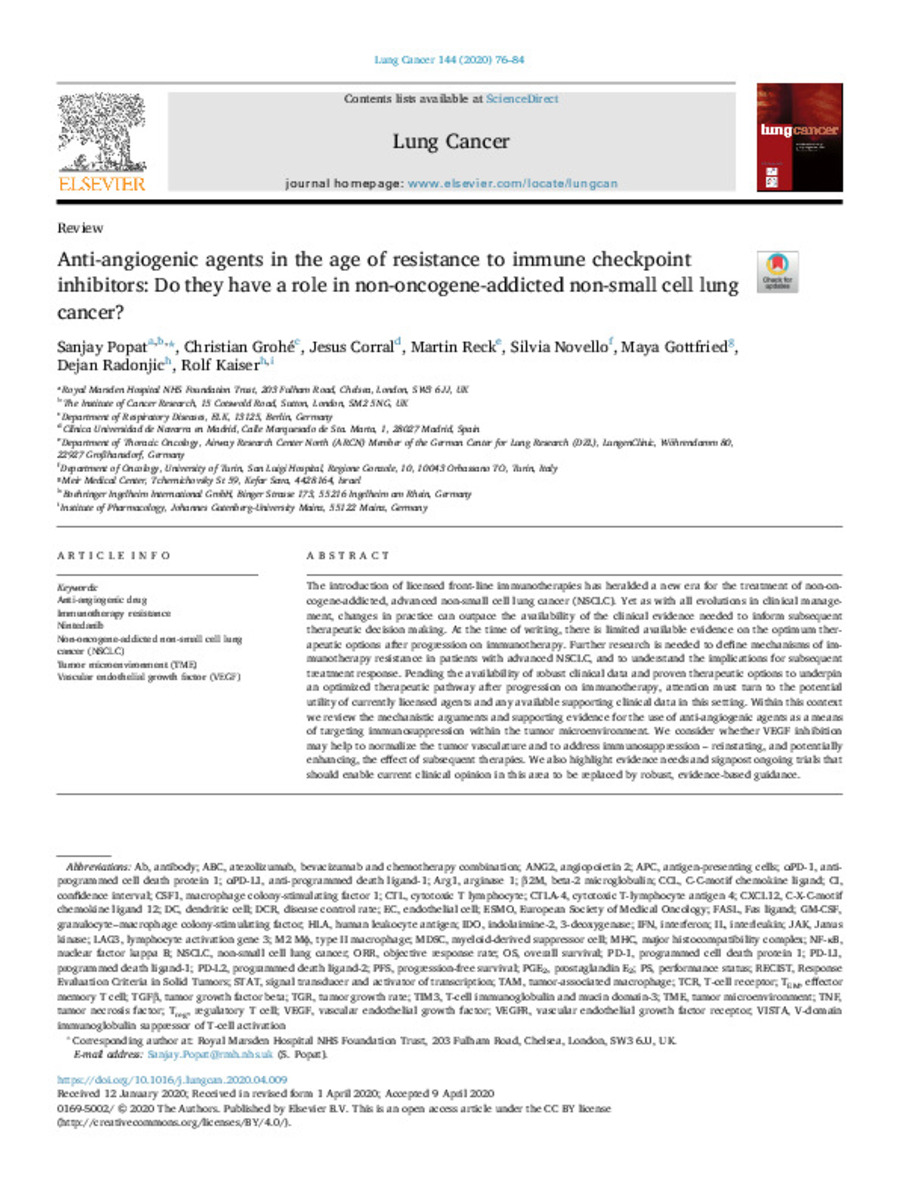Registro completo de metadatos
| Campo DC | Valor | Lengua/Idioma |
|---|---|---|
| dc.creator | Popat, S. (Sanjay) | - |
| dc.creator | Grohé, C. (Christian) | - |
| dc.creator | Corral, J. (J.) | - |
| dc.creator | Reck, M. (Martin) | - |
| dc.creator | Novello, S. (S.) | - |
| dc.creator | Gottfried, M. (Maya) | - |
| dc.creator | Radonjic, D. (Dejan) | - |
| dc.creator | Kaiser, R. (Rolf) | - |
| dc.date.accessioned | 2023-07-03T10:19:12Z | - |
| dc.date.available | 2023-07-03T10:19:12Z | - |
| dc.date.issued | 2020 | - |
| dc.identifier.citation | Popat, S. (Sanjay); Grohé, C. (Christian); Corral, J. (J.); et al. "Anti-angiogenic agents in the age of resistance to immune checkpoint inhibitors: Do they have a role in non-oncogene-addicted non-small cell lung cancer?". Lung Cancer. 144, 2020, 76 - 84 | es |
| dc.identifier.issn | 0169-5002 | - |
| dc.identifier.uri | https://hdl.handle.net/10171/66755 | - |
| dc.description.abstract | The introduction of licensed front-line immunotherapies has heralded a new era for the treatment of non-oncogene-addicted, advanced non-small cell lung cancer (NSCLC). Yet as with all evolutions in clinical management, changes in practice can outpace the availability of the clinical evidence needed to inform subsequent therapeutic decision making. At the time of writing, there is limited available evidence on the optimum therapeutic options after progression on immunotherapy. Further research is needed to define mechanisms of immunotherapy resistance in patients with advanced NSCLC, and to understand the implications for subsequent treatment response. Pending the availability of robust clinical data and proven therapeutic options to underpin an optimized therapeutic pathway after progression on immunotherapy, attention must turn to the potential utility of currently licensed agents and any available supporting clinical data in this setting. Within this context we review the mechanistic arguments and supporting evidence for the use of anti-angiogenic agents as a means of targeting immunosuppression within the tumor microenvironment. We consider whether VEGF inhibition may help to normalize the tumor vasculature and to address immunosuppression – reinstating, and potentially enhancing, the effect of subsequent therapies. We also highlight evidence needs and signpost ongoing trials that should enable current clinical opinion in this area to be replaced by robust, evidence-based guidance. | es_ES |
| dc.description.sponsorship | Medical writing assistance was supported financially by Boehringer Ingelheim. SP acknowledges NHS funding to the Royal Marsden Hospital NIHR Biomedical Research Centre. | es_ES |
| dc.language.iso | eng | es_ES |
| dc.publisher | Elsevier | es_ES |
| dc.rights | info:eu-repo/semantics/openAccess | es_ES |
| dc.subject | Anti-angiogenic drug | es_ES |
| dc.subject | Immunotherapy resistance | es_ES |
| dc.subject | Nintedanib | es_ES |
| dc.subject | Non-oncogene-addicted non-small cell lung cancer (NSCLC) | es_ES |
| dc.subject | Tumor microenvironment (TME) | es_ES |
| dc.subject | Vascular endothelial growth factor (VEGF) | es_ES |
| dc.title | Anti-angiogenic agents in the age of resistance to immune checkpoint inhibitors: Do they have a role in non-oncogene-addicted non-small cell lung cancer? | es_ES |
| dc.type | info:eu-repo/semantics/article | es_ES |
| dc.description.note | This is an open access article under the CC BY license (http://creativecommons.org/licenses/BY/4.0/). | es_ES |
| dc.identifier.doi | 10.1016/j.lungcan.2020.04.009 | - |
| dadun.citation.endingPage | 84 | es_ES |
| dadun.citation.publicationName | Lung Cancer | es_ES |
| dadun.citation.startingPage | 76 | es_ES |
| dadun.citation.volume | 144 | es_ES |
| dc.identifier.pmid | 32387684 | - |
Ficheros en este ítem:
Estadísticas e impacto
Los ítems de Dadun están protegidos por copyright, con todos los derechos reservados, a menos que se indique lo contrario.






